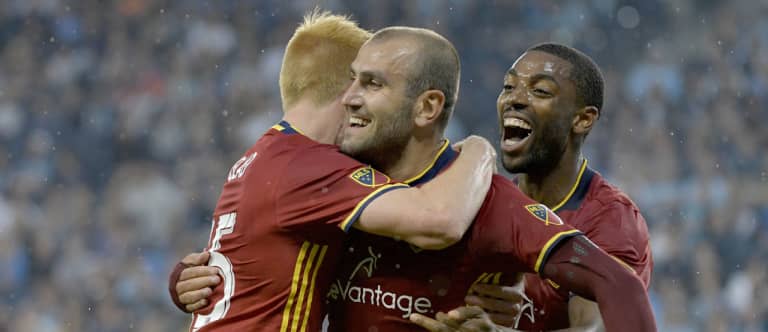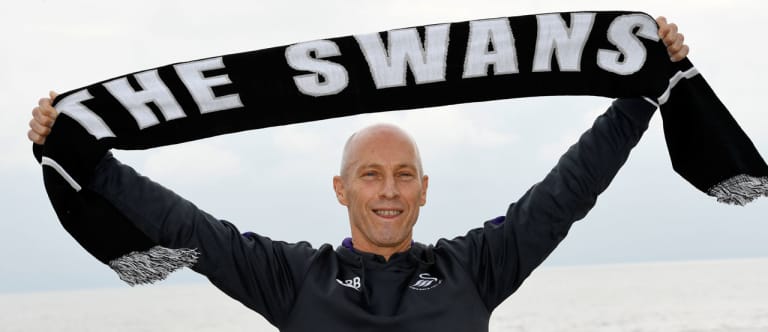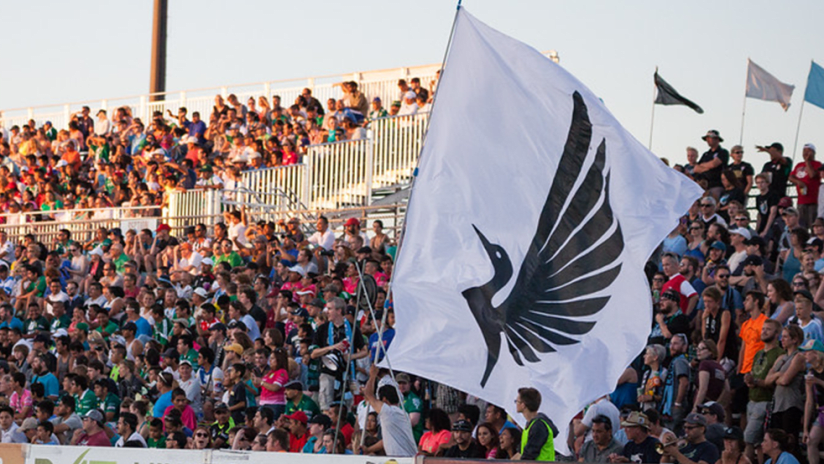If Minnesota United FC have made any progress in their coaching search since it was reported last month that the team was considering replacing current manager Carl Craig with a more experienced MLS candidate, Manny Lagos certainly isn’t letting on.
Minnesota’s sporting director is currently trying to pull off a bit of a tricky public balancing act. On one hand, his club are in a dogfight in NASL, clinging to a slim lead for the league’s fourth and final playoff spot with just three regular season games remaining. On the other, they have just five months remaining until they kick off their inaugural MLS campaign. They’ll need to decide well before then whether they'll stick with Craig or identify a replacement, not to mention construct a roster capable of competing in MLS.
For Lagos, talking too much about the club’s MLS plans would be a disservice to their current NASL campaign. Talk too little about them, however, and folks may start to wonder just what’s going on in the Twin Cities.
For now, he’s fine erring on the side of caution.
The former MLS and US national team midfielder was taciturn in a phone interview about the club’s plans on Wednesday. Apart from confirming that no formal interviews for the head coaching job have taken place, he was hesitant to discuss much about the managerial position. It was reported by ESPN FC's Jeff Carlisle and Minnesota soccer site FiftyFive.one in September that the club had put together a short list of candidates that included Craig, Sigi Schmid, Adrian Heath, Dominic Kinnear and Tom Soehn.
He also was reluctant to comment on his roster plans, including the 2017 status of defenders Justin Davis and Kevin Venegas, who the club announced were signed to “long-term contracts” in January. Lagos, who took a 10-day scouting trip to five European countries late last month, also didn’t go in-depth on any potential Designated Player plans, declining to share whether or not he expects the club to have any DPs on the roster when they begin MLS play next March.
Viewed through the lens of their current campaign, Lagos’ reluctance to say too much is understandable. Winless in their last six matches, Minnesota have several teams hot on their tails for the NASL’s fourth and final playoff spot. Rayo OKC are tied on points with the Loons, Carolina and Tampa Bay are one point back and Miami are just two points off the pace. Both of the Florida clubs have a game in hand on Minnesota, who host second-place Edmonton on Saturday before closing the regular season with games at Carolina and at home against the first-place New York Cosmos.
Even with the 2017 MLS season looming, Lagos doesn’t want to distract from the team’s playoff push, so he’s staying quiet – going as far as to decline to provide a timeframe for when he’d like to have a coach in place and when the team will inform current players whether or not they’ll move with the club to MLS.
“I can’t comment or talk about current contract status or roster status because I think it’s not fair to what our group of guys are trying to do on the field and how they’re trying to finish out this year,” he said in a phone interview.
One item Lagos was willing to talk about is Sunday’s Expansion Priority Draft. He’ll be in attendance in New York for the draft, which will feature a coin flip between Minnesota and fellow 2017 expansion club Atlanta to determine who gets first pick in choosing priority for six different player acquisition mechanisms.
“I think this is exciting because it’s the first kind of event since [the August announcement that they’d join MLS in 2017] that really pushes us in a direction toward the future,” he said. “It’s exciting for us internally because it kind of opens up how we want to build our business and planning for the next three or four months, depending on what draft picks we get and the different mechanisms to find players to build our roster… It really starts to put a direction in terms of the team-building process officially towards next year.”
That should be a welcome step for Minnesota fans, who haven’t had much in the way of concrete MLS news in the last couple of months.

RSL renegotiate Movsisyan transfer, create roster clarity
Real Salt Lake permanently acquired striker Yura Movsisyan earlier this week, signing the 29-year-old to a new, “multi-year” Designated Player contract and completing his transfer from Spartak Moscow after initially acquiring him on loan from the Russian club last December.
The deal, which was written about at length by The Salt Lake Tribune’s Chris Kamrani, began coming into place at the behest of Movsisyan, who called a meeting several months ago to tell RSL GM Craig Waibel that he wanted to extend his stay in Utah past the December expiration of his loan.
From there, Waibel told me over the phone on Wednesday, RSL and Spartak launched into a new three-and-a-half-month negotiation that was largely facilitated by Movsisyan’s agent, Patrick McCabe.
At the core of their talks was the negotiation of a new transfer fee. The initial loan deal included a price at which Salt Lake could permanently acquire Movsisyan, but Waibel, RSL and Spartak went back to the table and hammered out a new figure.
Knowing that Movsisyan, who played for Salt Lake from 2007-2009 before moving to Europe, wanted to stay in Utah and, if he’d gone back to Moscow, would’ve gone back an unhappy player, RSL felt like they had a bit of leverage in negotiations with Spartak.
“The details of the loan agreement had a specific number that we could’ve executed [to acquire Movsisyan permanently] on or before a specific date… Essentially what it came down to was going back and working on that number that we didn’t feel truly represented both parties' interest,” Waibel said. “I can tell you [the transfer fee] didn’t land exactly where the original agreement was, but it was handled very, very professionally on their end.”
He wouldn’t specifically confirm it, but Waibel all but officially said that the renegotiation lowered the transfer fee initially included in the loan agreement.
“Rarely would I negotiate higher,” he said when asked if the final fee was indeed lower than the price agreed upon at the time of the loan.
Waibel, who is headed to Scandinavia on Friday for a 10-day scouting trip, believes locking up Movsisyan is a solid move for Salt Lake. The Armenian’s nine goals have fallen somewhat short of expectations, but he’s added plenty of value by effectively occupying opposing center backs to create space for fellow Designated Players Joao Plata and Burrito Martinez to run at defenders on the wings.
That ability has paid dividends for RSL, who are 9-2-7 when that trio – who have combined for a total of 25 goals and 17 assists this year – start together.
Finalizing Movsisyan’s transfer also gives RSL some roster clarity heading into the winter. Along with Martinez (whose contract ends after the 2017 season), he’ll be one of two DPs on Salt Lake’s roster at the start of 2016. Waibel said that Plata, who is under contract for multiple years beyond this season, will no longer be a DP after this year. He said that RSL are considering moving to a “two Designated Player model” and that they aren’t planning on bringing in a third DP for the start of 2017, though they could potentially use that final slot in a future transfer window.
That’s all a bit immaterial at the moment, however. For now, RSL are focused on ending their five-game winless run and clinching a playoff berth with a home win against Sporting KC on Sunday (5 pm ET; MLS LIVE).
They’ll have a happy – and now fully healthy – Movsisyan there to lead the charge.

Bullish on Bob
A week and a half ago, Bob Bradley became the first American to be hired as manager of an English Premier League team when Swansea City appointed him to replace Francesco Guidolin.
Since the news first broke last Monday, we’ve been treated to all manner of takes from both sides of the Atlantic. Some British commenters see Swansea’s American owners playing a bit of favoritism with a countryman many don’t perceive to have the chops to succeed in the Best League in the World™. Americans, on the other hand, have largely defended Bradley, celebrating the 58-year-old for reaching the EPL after a long career featuring stints in MLS, with the US and Egyptian national teams, in Norway and, most recently, with Le Havre in the French second-division.
The man himself has mostly downplayed the whole thing, declaring in his opening press conference that he doesn’t view himself as a pioneering American, but rather just another manager.
The one thing we haven’t heard all that much about in the wave of Red, White and Blue-tinted coverage is, of course, the most important: Bradley’s ability as a manager.
We view him a little bit differently now, but many – myself included – thought of Bradley as a relatively conservative coach during his time with the USMNT. He was largely seen as predictable and a bit defensive, but certainly got results, too. He led the team to the Round of 16 at the 2010 World Cup, won the 2007 Gold Cup and finished second at the 2009 Confederations Cup before being ousted after losing to Mexico in the 2011 Gold Cup final.
For most Americans, that’s where the familiarity ends. We know the broad strokes of his post-USMNT career (taking Egypt to the brink of the World Cup despite leading the team during a massively turbulent moment in the country’s history, overachieving in Norway, moderate success in France), but we haven’t really explored the nitty-gritty details behind his Egypt, Stabaek or Le Havre teams.
According to one of his former players, we’ve been missing out on a masterclass in progressive, attacking managing.
Ex-Columbus Crew and Real Salt Lake midfielder Cole Grossman played under Bradley at Stabaek in 2015, when the underdog Norwegian club – who were widely predicted to be in a relegation dogfight that year – shocked observers by finishing third and qualifying for the Europa League.
Stabaek and Bradley, whose first game with Swansea will come on Saturday at Arsenal, pulled it off despite a tiny budget and a thin roster. Grossman said it included only “13 or 14” fully professional field players, with the rest of the squad filled out by little-used academy kids. In fact, only 15 players appeared more than 10 times in league play for Stabaek that year, a number that illustrates the team’s severe lack of depth.
Bradley was able to turn his small, lightly-regarded roster into a consistent winner that, according to Grossman, played an up-tempo, attractive 4-2-3-1 that featured a passing game as pretty and as effective as any in Norway.
Doesn’t quite jibe with the criticism he faced with the USMNT, right?
“What would people say about Bob as the national team coach? Boring, defensive, but what I saw every day was in some ways the polar opposite of that description,” Grossman, who I worked with at Real Salt Lake in 2013 and 2014 and is still at Stabaek, told me over the phone earlier this week. “I saw Bob daily as kind of an innovator and a deep thinker. We were playing, to me, cutting-edge stuff in the way that our team moved, in the way we were able to attack. I felt like we were, that this was really different.
“He had a group of outcasts and academy players and turned us into one of the best teams in Norway and a team that I think played some of the best stuff really in all of Scandinavia.”
Bradley worked magic at Stabaek through a combination of teaching and tactics that Grossman said is unique to any coach he’s worked with or heard about during his five-year professional career.
He said that Bradley has a unique ability to not only articulate how he wants his team to play, but to actually show players how to implement that style on the training field. That ability, Grossman said, is one of the biggest reasons for Stabaek’s successful 2015.
“Sometimes if you lose a game, a coach says, ‘Well, the final ball wasn’t there’ or ‘We didn’t pick the right pass.’ And to me, what that means is the coach is just throwing out three, four good attacking players and saying you guys make plays to go win us the game,” Grossman said. “That can work, but what I saw from Bob was he taught us every day, in the work we did on the field and watching film, how to space our team and how to have the right runs and how to create timing in our attacking movements that was able to break teams down and create chances and goals.
“I know that should be the prerequisite for every coach, but it’s not.”
Coaching in the Premier League will be a different sort of test, of course. The external pressure will be far more substantial, the players are more established and perhaps trickier to manage than the young team he had in Norway and fans and owners probably won’t be all that patient if he has any extended rough patches.
But Grossman thinks Bradley’s ability to successfully teach his tactics will travel. That attribute, along with the coach’s famously detail-oriented nature — Grossman recalled a story in which Bradley told him he’d re-watched Stabaek’s previous game 15 times less than three days after the match — leave the midfielder with little doubt that his former boss will be a success with Swans.
“He has the leadership and the personality and the experience to be a strong figure in the locker room, but that isn’t enough. The reason I think he’s going to succeed more than anything else is his consistent ability to teach on the training field and coach spacing, timing and attacking movement,” Grossman said.
“It’s going to be the ultimate test, but honestly, I would be stunned if it didn’t work. That’s not to say that I guarantee he’s going to win, just because this sport is so unpredictable, but from what I saw daily, I would be stunned if it didn’t translate.”













